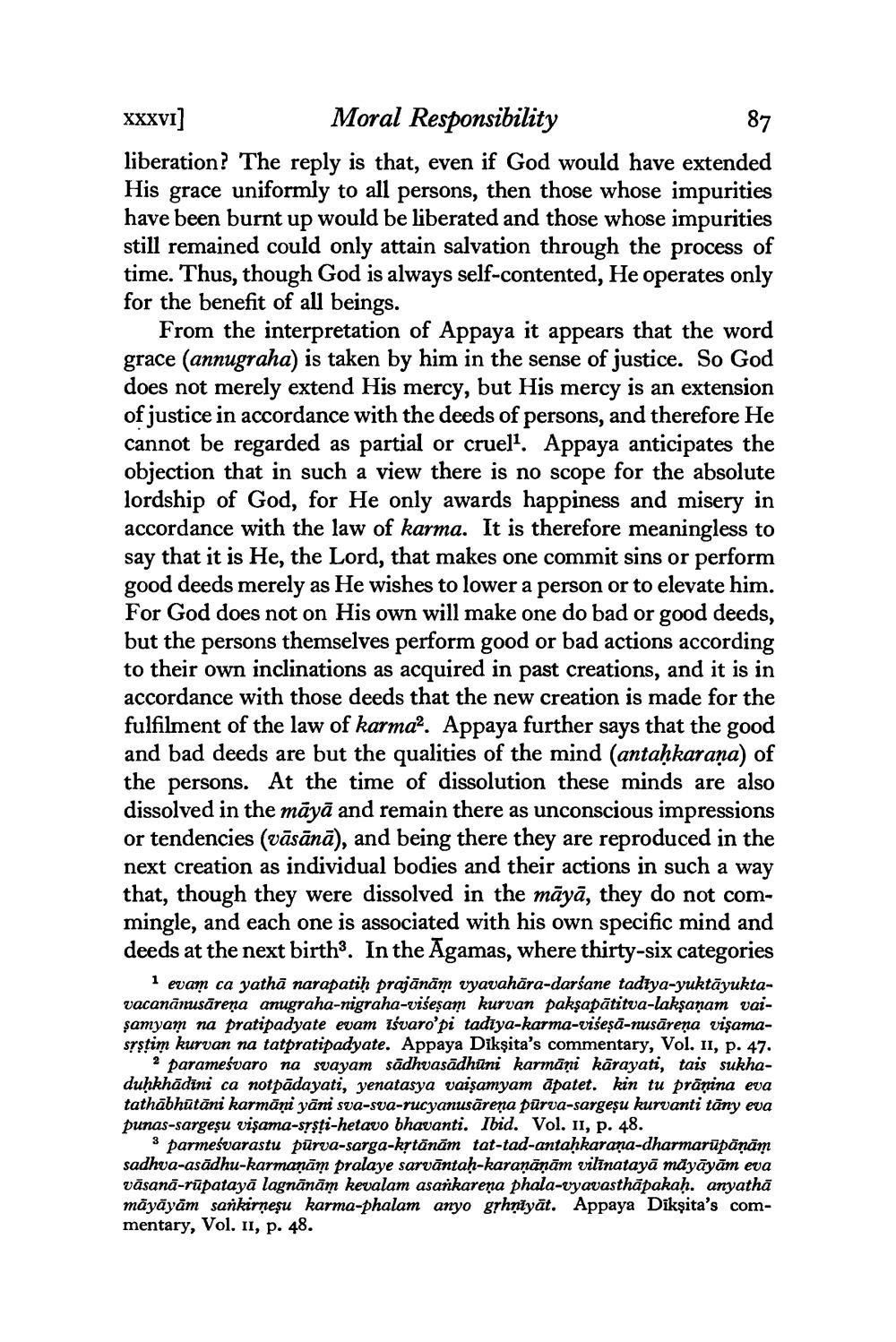________________
87
XXXVI]
Moral Responsibility liberation? The reply is that, even if God would have extended His grace uniformly to all persons, then those whose impurities have been burnt up would be liberated and those whose impurities still remained could only attain salvation through the process of time. Thus, though God is always self-contented, He operates only for the benefit of all beings.
From the interpretation of Appaya it appears that the word grace (annugraha) is taken by him in the sense of justice. So God does not merely extend His mercy, but His mercy is an extension of justice in accordance with the deeds of persons, and therefore He cannot be regarded as partial or cruell. Appaya anticipates the objection that in such a view there is no scope for the absolute lordship of God, for He only awards happiness and misery in accordance with the law of karma. It is therefore meaningless to say that it is He, the Lord, that makes one commit sins or perform good deeds merely as He wishes to lower a person or to elevate him. For God does not on His own will make one do bad or good deeds, but the persons themselves perform good or bad actions according to their own inclinations as acquired in past creations, and it is in accordance with those deeds that the new creation is made for the fulfilment of the law of karma2. Appaya further says that the good and bad deeds are but the qualities of the mind (antahkarana) of the persons. At the time of dissolution these minds are also dissolved in the māyā and remain there as unconscious impressions or tendencies (vāsānā), and being there they are reproduced in the next creation as individual bodies and their actions in such a way that, though they were dissolved in the māyā, they do not commingle, and each one is associated with his own specific mind and deeds at the next birth. In the Agamas, where thirty-six categories
1 evam ca yathā narapatiḥ prajānām vyavahāra-darśane tadiya-yuktāyuktavacanānusāreņa anugraha-nigraha-višeşam kurvan pakşapātitva-lakşaņam vaişamyam na pratipadyate evam īśvaro'pi tadiya-karma-višeşā-nusārena visamasrstim kurvan na tatpratipadyate. Appaya Dikşita's commentary, Vol. II, p. 47.
2 paramešvaro na svayam sādhvasādhūni karmāņi kārayati, tais sukhaduḥkhādini ca notpadayati, yenatasya vaişamyam apatet. kin tu prānina eva tathābhūtāni karmāņi yāni sva-sua-rucyanusāreņa pūrva-sargeșu kurvanti tāny eva punas-sargeșu vişama-systi-hetavo bhavanti. Ibid. Vol. II, p. 48.
parmeśvarastu pūrva-sarga-kstānām tat-tad-antahkarana-dharmarūpāņām sadhva-asādhu-karmaņām pralaye sarväntah-karaņānām vilīnatayā māyāyām eva vāsanā-rūpatayā lagnānām kevalam asankarena phala-vyavasthāpakaḥ. anyathā māyāyām sankirņeşu karma-phalam anyo gļhnīyāt. Appaya Dikşita's commentary, Vol. II, p. 48.




